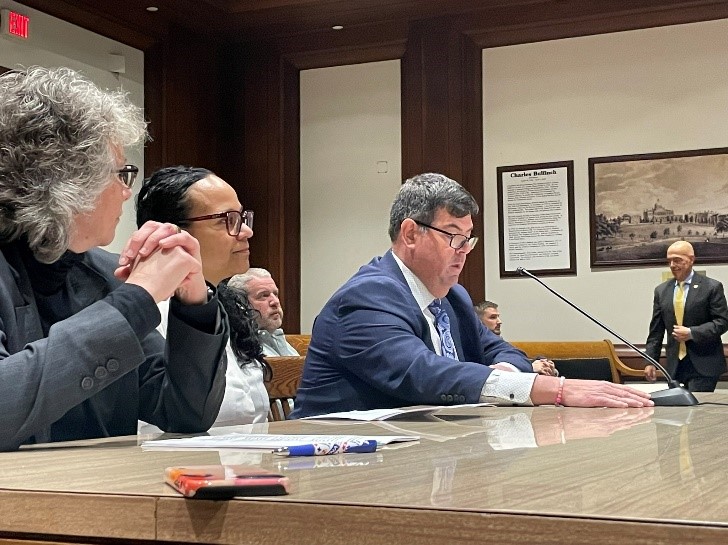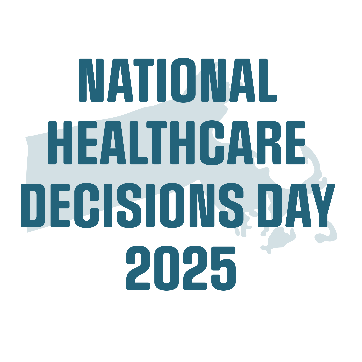INSIDE THE ISSUE
> Workplace Violence Consensus
> Healthcare Decisions Day
> ED Care Threatened
> Rx Tariffs
> Transitions
MONDAY REPORT
Consensus Workplace Violence Bill Gets Early-Session Hearing
Groups representing hospitals, nurses, and healthcare workers across Massachusetts came together at the State House last Wednesday to urge passage of a bill that would address the worsening crisis of workplace violence in healthcare settings.

Leaders from MHA, the Massachusetts Nurses Association (MNA), and 1199SEIU Massachusetts delivered testimony in united support of An Act Requiring Health Care Employers to Develop and Implement Programs to Prevent Workplace Violence (H.2655/S.1718).
Every 36 minutes, a worker in a Massachusetts hospital is subject to an act of violence or a threat. This crisis has grown at an alarming rate in recent years, with healthcare workers experiencing a violent incident at least five times more often than the average private sector worker.
While the groups had supported similar but separate proposals in previous sessions, this marks the first time that a single, consensus piece of workplace violence legislation has been put before local policymakers. MHA, MNA, and 1199SEIU representatives urged its passage before the Joint Committee on Public Safety and Homeland Security last week.
“A crisis of this magnitude requires true collaboration to solve, and that is exactly what this legislation represents,” said MHA President & CEO Steve Walsh. “Our hospitals and healthcare workers are proudly standing up together to ensure that violence is never just part of the job. These bills give policymakers a rare opportunity to pass reforms that were crafted in partnership with leading advocacy organizations, would make a real difference to the daily work of healthcare professionals, and can place the commonwealth at the forefront of care delivery yet again – because our healthcare workers need to be focused on saving lives, not defending their own.”
An Act Requiring Health Care Employers to Develop and Implement Programs to Prevent Workplace Violence is a comprehensive policy reform designed to reduce violence at hospital facilities by:
- Requiring all Massachusetts hospitals to develop a facility-specific risk assessment and then use that assessment to implement a comprehensive program to reduce the risk of workplace violence.
- Engaging the workforce in developing the assessment/program that includes worker training, and provides a formal written violence prevention plan available upon request to all employees/labor organizations.
- Establishing strong enforcement through DPH licensing, regular reporting, and job protections for affected workers that include additional paid leave for assaulted workers.
The bill also makes it a felony to “knowingly and intentionally” commit an assault or an assault and battery on a healthcare employee while in the line of duty. The healthcare leaders explained to legislators that this would not apply to people experiencing a behavioral health crisis, who are acting outside of their usual judgement.
“Nurses and healthcare workers have long been harmed by workplace violence, more so than any other profession,” said MNA’s Executive Director Julie Pinkham, R.N. “We have worked collaboratively with MHA and 1199 to address this growing problem through legislation that will protect all staff and patients.”
Local healthcare professionals continue to report being punched, bitten, kicked, and suffering other forms of abuse over the course of their shifts. Even with many incidents never reported, thousands suffer violent injuries annually. Workforce shortages and strains, unstandardized security prevention and planning, and a lack of appropriate consequences all contribute to these unacceptably dangerous working conditions.
“Workplace violence is a very real and very serious problem for the entire care team including patient transporters, phlebotomists, mental health counselors, dietary, and housekeeping,” said 1199SEIU Vice President Cari Medina. “Ultimately, workplace violence impacts every hospital worker member who interacts with hospital patients, their visitors, or the general public. That is why it is critical for worker voices to be a part in developing a comprehensive plan that includes employee training and any appropriate changes in job design necessary to implement it.”
The proposal has earned widespread legislative support, with 68 total sponsors to date. Its lead sponsors are Representative John Lawn (D-Watertown) and Senator Joan Lovely (D-Salem).
At the hearing last Wednesday, several members of the Committee on Public Safety and Homeland Security expressed support for the bill.
Have You Designated a Healthcare Proxy?

National Healthcare Decisions Day is this Wednesday, April 16, but Honoring Choices Massachusetts each year extends the single-day recognition from March to June as part of its “Spring Celebration” focus on ensuring people have designated a healthcare agent and have completed a healthcare proxy form.
There are many reasons why it is important for people to make their care decisions known in the event they are incapacitated and can’t speak for themselves. One such reason is that having a care plan in place helps alleviate the “stuck patient” issue that is currently affecting the entire healthcare system. As MHA’s monthly throughput survey shows, each month more than 2,000 patients are stuck in acute and post-acute care hospitals unable to transition to the next level of care in either their home or post-acute facility.
A healthcare agent is the person empowered to make care decisions for a patient if that patient becomes incapacitated. A healthcare proxy allows a person to outline their care wishes should they ever be in a position not to do so themselves. Without them, a patient who is ready for discharge and would otherwise be transferred from an acute care hospital to post-acute care often becomes stuck in the hospital. Without guidance from a proxy, providers are unable to determine who can authorize treatment for an incapacitated patient. A hospital may then have to go to the courts to establish guardianship for the patient, which causes transfer delays.
“While nine out of 10 Americans recognize the importance of having a trusted person to make healthcare decisions on their behalf should they be unable to, only one in three has taken the necessary step to empower that person by completing a healthcare proxy,” said Jessica Zeidman, M.D., deputy commissioner and chief medical officer at the Massachusetts Department of Public Health. “This gap is concerning, and it is a challenge that we, as a healthcare community, can work together to address. Resources, such as those developed by Honoring Choices and the MHA Simple Step Campaign, are widely available to help people take this important step and support healthcare providers closing this critical gap.”
The Simple Step Campaign is a call to action championed by advocacy groups from across the continuum of care, including MHA, Honoring Choices Massachusetts, the Massachusetts Medical Society, the Home Care Alliance of Massachusetts, the Massachusetts Senior Care Association, LeadingAge Massachusetts, Mass Aging Access, and the Hospice & Palliative Care Federation of Massachusetts. The coalition urges every patient aged 18 and over to take the “simple step” of designating a healthcare agent to make care decisions on their behalf if needed.
An agent can be a family member, friend, co-worker, faith or community group member, or anyone you trust except a person employed in the facility where you are a patient unless related to you by blood, marriage, or adoption. Learn more through this Healthcare Proxy Tool Kit.
RAND Report Raises Caution About Emergency Care
A new report from the non-profit research company RAND warns that hospital-based emergency departments (EDs) in the United States are at risk due to a variety of factors, including patients with increasingly complex needs and falling payment rates.
ED wait times are increasing, as are the number of patients boarding in EDs and the volume of uncompensated care, RAND found. The report recommends a new, tiered payment model to help alleviate the problem.
Strategies for Sustaining Emergency Care in the United States notes that “patient complexity is on the rise, with EDs managing patients with complex medical and social needs, such as older adults, patients with mental illness, survivors of violence, veterans, unhoused individuals, and undocumented immigrants. Importantly, ED patient acuity has also been on the rise over the past dozen years, translating to an increase in demand for critical care services in the ED.”
At the same time, payment to physicians per ED visit is falling, placing strains on M.D. practices that operate independently of hospitals. Uncompensated or undercompensated care is also rising for a variety of reasons, including “insurer downcoding—in which a healthcare service claim is changed to a lower care level by the payer, resulting in a lower payment,” according to the report.
Trump Promises New Tariffs on Pharmaceuticals
Last week, President Trump paused for 90 days the reciprocal tariffs he had placed on close to 90 countries, but increased the tariffs on China to 145%. The president also kept the baseline 10% tariff for imported goods he had already imposed on all countries. The previously enacted 25% tariffs on steel, aluminum, cars, and car parts will also remain in effect.
The reciprocal tariffs to date have exempted certain products, including pharmaceuticals. But last Tuesday, the president said, “We’re going to be announcing very shortly a major tariff on pharmaceuticals. And when they hear that, they will leave China. They will leave other places because they have to sell — most of their product is sold here, and they’re going to be opening up their plants all over the place in our country.” The President’s Trade Representative, Jamieson Greer, indicated in testimony before Congress that any pharmaceutical levies would not go into effect before the Commerce Department conducts a Section 232 investigation, a process that can take several weeks or months. However, that procedure is not guaranteed given the administration’s willingness to swiftly impose duties on specific sectors.
Pharmacy spending in Massachusetts has grown 10% year over year, according to the latest data from the state’s Center for Health Information and Analysis (CHIA).
Transition
Mass General Brigham has named Greg Jackson to the dual role of president and chief operating officer of Spaulding Rehabilitation, effective immediately. Jackson has served as interim president since last September and as COO since May 2023. Spaulding Rehabilitation operates four inpatient facilities and 25 outpatient centers throughout Eastern Massachusetts. Jackson began his career as a medical lab technician, receiving his bachelor’s degree in psychology and master’s degree in rehabilitation counseling from Arkansas State University. He previously served as CEO of CHI Franciscan Rehab Hospital in Tacoma, Washington.

 Massachusetts Health & Hospital Association
Massachusetts Health & Hospital Association 